Coconut Milk: Best and Worst Brands
Coconut milk is a common ingredient in Asian cuisine.
In recent years it has become a popular ingredient in non-dairy beverage blends (in a similar vein to almond milk).
The difference between coconut milk and coconut cream
Both coconut milk and cream are a mix of coconut flesh and water. The difference lies in the ratios.
- Canned coconut milk – typically one part coconut flesh to two parts water. Consistency is thinner. Used for cooking.
- Canned coconut cream – typically four parts coconut flesh to one part water. Consistency is thicker and creamier. Used for cooking.
- Cartoned coconut milk beverage – very small amounts of coconut flesh to water. Fortified with vitamins. Used for drinking (as a cow’s milk alternative).
What are the best coconut milk beverages (cartons)?
Determining the healthiest is not easy. Coconut is itself high in fat, so the beverages are heavily diluted. Some are slightly sweetened, and others are fortified with vitamins.
The best coconut milk beverages
- So Delicious (unsweetened)
- Best on a budget: Silk (unsweetened)
Brands to avoid is Coconut Dream (uses carrageenan).
Where do I get good coconut milks?
The best source for high-quality coconut milk is Thrive Market. They only carry the best products in each line.
What are the best canned coconut milks?
These cans are BPA-free, and have simple ingredients without additives.
- Native Forest
- Natures Greatest
- Trader Joe’s
- Natural Value
Coconut milk cans to avoid
Both these brands use sulfites and are in BPA-lined cans.
- Chaokoh
- Goya
List of cartoned coconut milk beverages
Vita Coco Coconut Milk
Simple ingredients, no vitamin fortification. Lower proportion of coconut cream.
- Original has 50 calories, 5 g sugar, 3 g fat, 0 g protein per one-cup serving.
Ingredients (original): Organic coconut water from concentrate, organic coconut cream, gellan gum.
- Organic
Silk Unsweetened Coconut Milk
Silk is one of the most popular, and the best variety to choose is the unsweetened.
- Unsweetened has 40 calories, 0 g sugar, 4 g fat, 0 g protein per one-cup serving.
- Original has 70 calories, 5 g sugar, 5 g fat, 0 g protein.
[Unsweet] Coconutmilk (Filtered Water, Coconut Cream), Vitamin and Mineral Blend (Calcium Carbonate, Vitamin E Acetate, Vitamin A Palmitate, Vitamin D2, Vitamin B12), Dipotassium Phosphate, Sea Salt, Sunflower Lecithin, Gellan Gum, Ascorbic Acid (To Protect Freshness), Natural Flavor.
So Delicious
The unsweetened is the best variety of the So Delicious brand of coconut milk.
- Unsweetened has 45 calories, 0 g sugar, 4.5 g fat, 0 g protein per one-cup serving.
- Original has 70 calories, 7 g sugar, 4.5 g fat, 0 g protein.
- Vanilla has 80 calories, 8 g sugar, 4.5 g fat, 0 g protein.
- Unsweetened vanilla has 50 calories, 0 g sugar, 4.5 g fat, 0 g protein.
[Unsweetened] Organic Coconutmilk (Filtered Water, Organic Coconut Cream), Contains 2% or Less of: Vitamin and Mineral Blend (Calcium Phosphate, Magnesium Phosphate, Calcium Carbonate, L-Selenomethionine [Selenium], Vitamin A Acetate, Vitamin D2, Zinc Oxide, Vitamin B12), Organic Sunflower Lecithin, Gellan Gum, Organic Locust Bean Gum, Sea Salt.
- Organic
Pacific Foods coconut milk
Uses a small amount of coconut water to improve flavor.
- Unsweetened has 45 calories, 0 g sugar, 4 g fat, 0 g protein per one-cup serving.
- Original has 60 calories, 3 g sugar, 4 g fat, 0 g protein.
- Unsweetened vanilla has 50 calories, 0 g sugar, 4 g fat, 0 g protein.
[Unsweetened] Water, Coconut Cream*, Contains 1% Or Less Of: Coconut Water Concentrate*, Gellan Gum, Guar Gum*, Natural Flavor, Sodium Citrate, Tricalcium Phosphate, Vitamin D2, Xanthan Gum.
- Organic
365 by Whole Foods Market
Uses a small amount of coconut water to improve flavor.
- Unsweetened has 50 calories, 0 g sugar, 5 g fat, 0 g protein per one-cup serving.
[Unsweetened] Organic Coconutmilk (Filtered Water, Organic Coconut Cream), Calcium Carbonate, Natural Flavor, Organic Locust Bean Gum, Gellan Gum, Sea Salt, Vitamin A Palmitate, Ergocalciferol (Vitamin D2), Cyanocobalamin (Vitamin B12)
- Organic
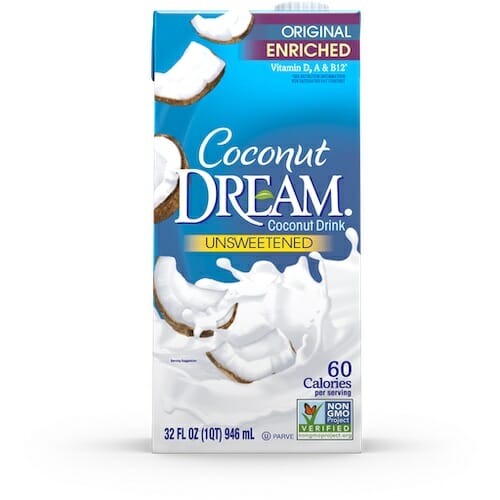
Coconut Dream
One of the few plant-based beverages to still use carageenan.
- Unsweetened has 60 calories, 0 g sugar, 5 g fat, 0 g protein per one-cup serving.
- Vanilla has 90 calories, 7 g sugar, 5 g fat, 0 g protein per one-cup serving.
[Unsweetened] Water, Coconut Cream, Tricalcium Phosphate, Carrageenan, Gellan Gum, Sea Salt, Natural Flavors, Vitamin D2, Vitamin A Palmitate, Vitamin B12.
How do coconut milk beverages compare with other milks?
Coconut milks tend to be lower in calories and sugar, but higher in fat compared to other plant-based milks.
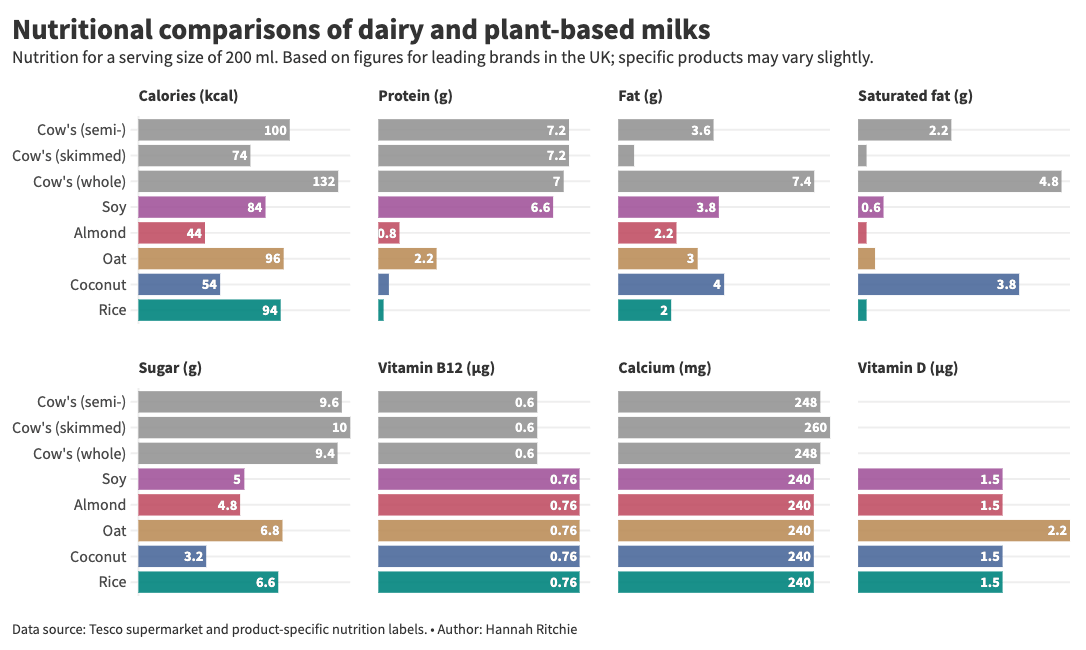
Questionable ingredients in coconut milk beverages
Vitamin A Palmitate
This is a way to supplement vitamin A and is generally considered safe. People who consume a diet with plenty of fruit and vegetables will already be getting an adequate supply.
Vitamin A can build up in the body to toxic levels, but this is very rare and you’d be need to drinking a lot of the beverage.
Carrageenan
Carrageenan is a texturizing additive derived from seaweed that used to be in most plant-based beverages. Regarded as safe by the FDA, but some people reported gastro-intestinal issues.
Very few beverages contain this now – most using guar gum or gellan gum to assist with texture.
Canned Coconut Milk vs Cream vs Light
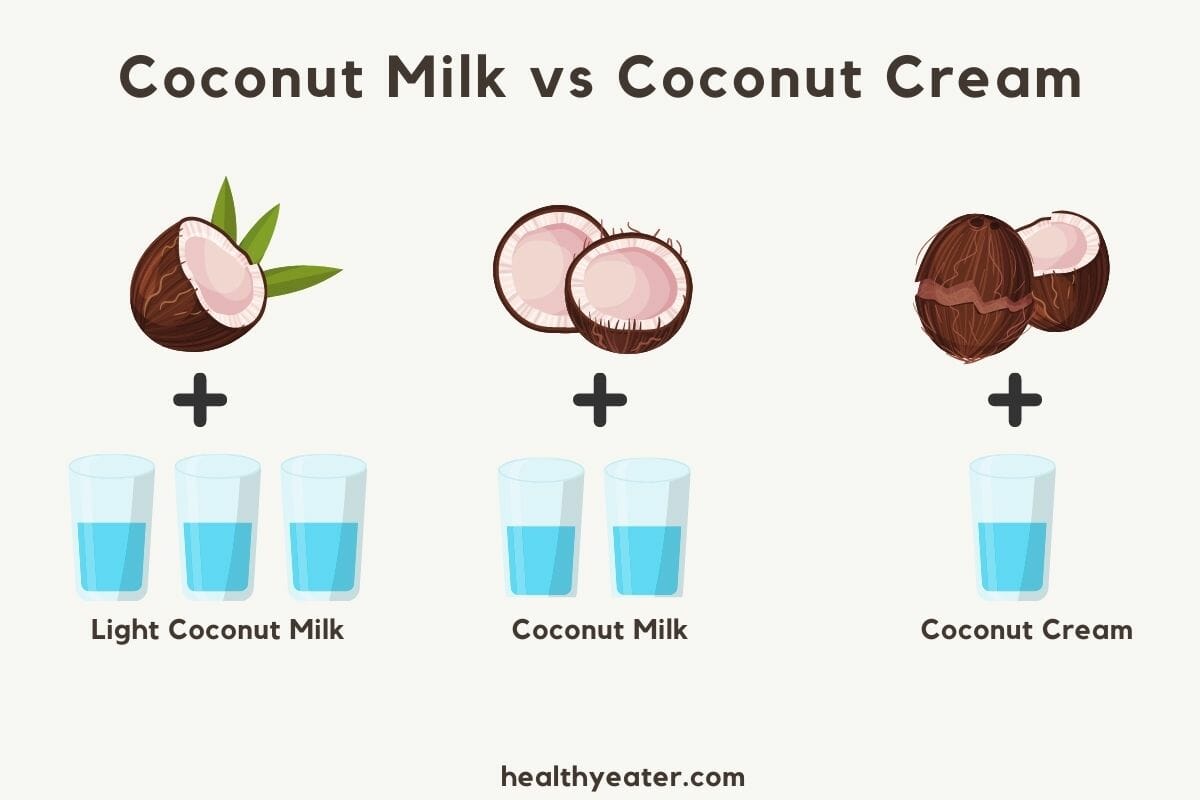
Coconut milk in cans is for cooking. There are typically three variations.
- Light / lite / reduced fat – Coconut is (by nature) a fatty food, so to appease consumers – there is a light version. It just means less coconut (typically half of normal milk) and more water. In many cases it may be uneconomic to buy.
- Milk – More coconut than light, less coconut than cream. Suitable for soups and curries – and cheaper than coconut cream.
- Cream – Lots more coconut – less water. More expensive, more suitable for desserts.
Tinned coconut milk isn’t usually fortified with vitamins – as it’s not made to mimic cow’s milk (like the carton beverages).
What about coconut water? This is a drinking beverage that is the high-potassium water that comes out of the coconut. No coconut meat has been shredded into it – so is not a ‘milk’.
List of Canned Coconut Milks
Canned coconut milk varieties abound, and the most important thing to watch out for is BPA lined cans.
Bisphenol-A is absolutely a health concern. If you use half a can, make sure you put it into another container when refrigerating.
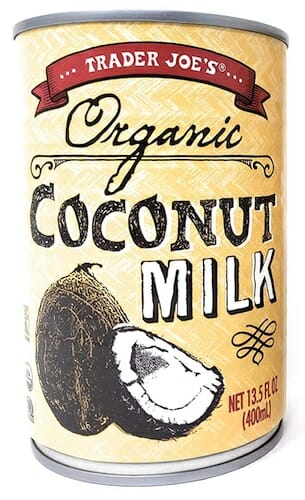
Trader Joe’s Canned Coconut Milk
- Reduced-Fat has 70 calories, 7 grams of fat, 1 gram of sugar, and 1 gram of protein in a 1/4 cup serving.
- Organic has 110 calories, 11 grams of fat, 1 gram of sugar, and 1 gram of protein per 1/4 cup serving.
- TJ’s Coconut Cream has 90 calories, 9 grams of fat, <1 gram of sugar, and 1 gram of protein per 2 tablespoons serving
Ingredients (organic): Water and Organic Coconut.
-
- USDA organic
- BPA-free
Nature’s Greatest
Organic range with just two ingredients.
Ingredients: Coconut extract and water.
- USDA organic
- BPA-free
- No guar gum
Native Forest Organic Simple
There is also Light and Classic (both of which contain Guar Gum).
- Light has per 1/4 cup serving has 45 calories, 4 grams of fat, <1 gram of sugar, and <1 gram of protein.
- Classic & Simple has per 1/3 cup serving has 140 calories, 15 grams of fat, 0 grams of sugar, and 1 gram of protein.
Ingredients: Organic Coconut Milk (organic coconut, purified water). BPA Free.
- USDA organic
- BPA-free
- No Guar gum (Simple and Turmeric version)
Natural Value
Despite the generic brand name, this is a good product.
- Lite has 60 calories, 5 grams of fat, 1 grams of sugar, 1 grams of protein per 1/3 cup serving.
- Regular has 150 calories, 15 grams of fat, 3 grams of sugar, 2 grams of protein per 1/3 cup serving.
Ingredients (regular): Organic coconut meat extract (53%), water (47%).
- USDA organic
- BPA free
Thai Kitchen (unsweetened)
- Lite has 50 calories, 4.5 grams of fat, 0 grams of sugar, and 0 grams of protein per 1/3 cup serving.
- Regular has 120 calories, 12 grams of fat, 1 gram of sugar and <1 gram of protein per 1/3 cup serving.
Ingredients (regular): Coconut, Water, Guar gum.
- Organic version available
Questionable ingredient(s)? BPA lined cans (Thai Kitchen do have a non-BPA resealable carton – but check availability).
Chaokoh Coconut Milk
This brand is not recommended because of the preservative used (sulfite).
Chaokoh has 150 calories, 14 grams of fat, < 1 gram of sugar and 2 grams of protein per 1/3 cup serving.
Ingredients: Coconut extract, water, citric acid, and sodium metabisulfite
Goya Coconut Milk
This brand is not recommended because of the preservative (sulfite) used.
Goya has 93 calories, 9 grams of fat, < 2 grams of sugar and 2 grams of protein per 2 fl oz serving.
Ingredients: Coconut extract, water, and sodium metabisulfite
Notable mentions
- Aroy-d coconut milk – Ingredients say 100% coconut – but some formulations may have the emulsifier E435 (noted on the EU labeling).
- Sungiven – coconut extract, water, and guar gum. BPA free.
- Roots circle – coconut extract, water, and xanthan gum. BPA free.
Is coconut milk the healthiest milk?
Compared to plant-based beverages, coconut milk doesn’t offer much, except it’s slightly higher in fat.
Coconut fat contains medium-chain triglycerides (MCTs), which benefit heart health.
The beverage cartons (not the canned milk) contain extra vitamins and minerals.
How to know which coconut milk can is the healthiest
There are many store brands of canned coconut milk, so use the following guidelines:
- Choose brands with no added sugar.
- Choose brands without carrageenan.
- Choose brands made with organic coconut when possible.
- Avoid brands with BPA-lined cans.
- Avoid brands that use preservatives like sulfites.
- Be wary of vitamin A palmitate based on your total vitamin A intake.
Coconut milk can be a healthy cow’s milk alternative for people who don’t like almond milk, soy milk, or rice milk.
Also, coconut milk seems to do a better job of whitening coffee or tea than the others but with a slight coconut flavor.
It’s also a great way to add flavor and good fats to recipes.
Useful Fact: Did you know coconut milk is the only cow’s milk alternative that works great for cooked “Jello” type puddings?
The Best and Worst series:
- Dark Chocolate: The Best and Worst Brands
- Plant-Based (Meatless) Burger Brands
- Almond Milk Brands
- Rice Milk Brands
- Snack Bar Brands
- Kombucha Brands
175 Comments
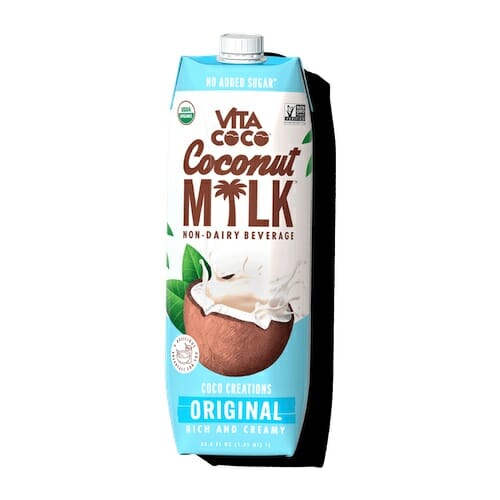




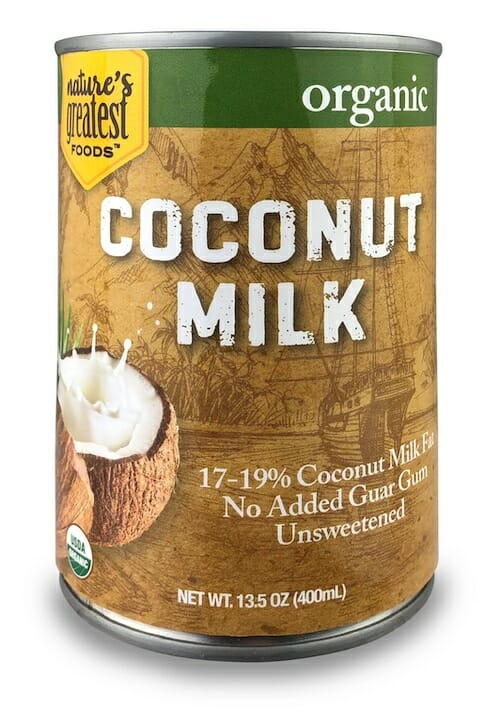







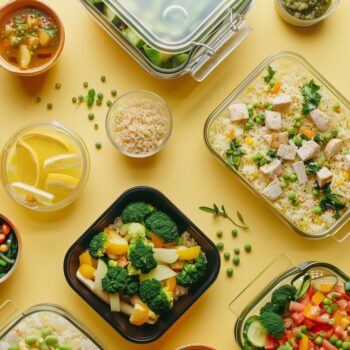 How to create macro meal plans (quickly) using ChatGPT
How to create macro meal plans (quickly) using ChatGPT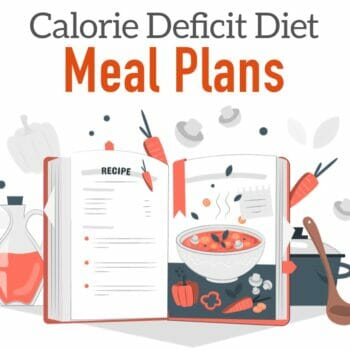 Calorie Deficit Meal Planner
Calorie Deficit Meal Planner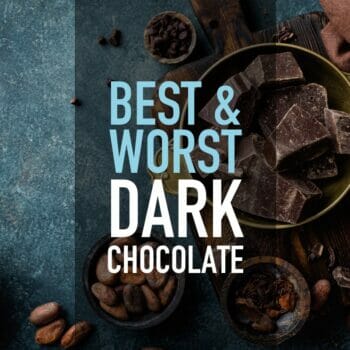 Dark Chocolate: The Best and Worst Brands
Dark Chocolate: The Best and Worst Brands Macro Friendly Family Dinners
Macro Friendly Family Dinners The Best Plant-Based Burgers: Brands to Choose and Avoid
The Best Plant-Based Burgers: Brands to Choose and Avoid
I’m just coming across this because I’m trying to figure out if using lecithin in my homemade coconut milk is a good idea. I wanted to try sunflower lecithing unless there is another non-soy alternative. I like making my own milk but it always separates so I’m hoping that this will help to keep it creamy! I don’t like the store alternatives because they fortify with calcium and it tastes so chalky to me!
I wish I could find a box of coconut milk that just has water and coconut as the ingredients. I’m so excited to try the Trader Joe’s Canned Coconut Milk though! Until I can get a new blender to make my own this is the one I’m hopeful for! I love coconut milk (and coconuts in general!). I’m on a histamine restricted diet and I’m also vegan (though I have confirmed psycho allergies to most animal products). My diet is pretty rigid so it makes me super happy to find lists like this that help me find new products that are viable for me! Thank you so much! <333
use the packet of hard block coconut, simmer in water, sieve then chill – nothing in it but 100% coconut!
where do you get this?
Aroy-D 100% coconut milk..available on Amazon…tastes like real cream in your coffee.?
Aroy-d is the only brand i buy, and I’ve tried many.
There’s also Native Forest’s organic “Simple” coconut milk (just coconut & water in the ingredients). I just tried it this morning for the first time. It tastes like coconut, unlike the ones with guar gum!! 🙂 I loooove coconut too! 🙂
Thank you, so much! I’ve switched to natural coconut milk for my coffee and some recipes. Some of the store brands have additional additives and I was unsure about Silk and SO. However, I find the canned coconut milk is so much more enjoyable and tastes more natural to me. I’m always leary of the mass produced and heavily marketed brands.
Great note about the Vitamin A! Using an app does help track those levels!
I have recently become vegetarian, as of Feb 10, 2016, I’ve noticed considerable tiredness and dark circles under my eyes, I did some research and found when not eating meat there is a lack of protein, B12, so I have been trying to eat more products with B12, I.e., Swiss cheese, yogurt, milk. I try to digest only organic products and since I have lactose intolerance I was drinking organic 1 °/° organic milk. In doing research I also found mention that coconut milk has B12, I have tried the SO unsweetened coconut milk, and I’ve also added a B12 supplement along with my D3 vitamin. I’m concerned though about the mention of synthetics and the Vitamin A acetate added to the SO coconut milk. How do I know I have the correct balance of vitamins in my diet??
Hi Wendy, you can track what you eat with myfitnesspal and make sure you achieve the RDA for each.
there are many people out there that can help you.
One thing is a veggie diet can have PLENTY OF PROTEIN,
so that is NOT really an issue. B-12 may be an issue, yet, if it shows up so soon, it is most likely not because of your intake. nutritional Yeast is one example of B-12 in food. Also – B-12 does not originate in animals. Also – consider a “parasite cleanse” to get healthy
check out Erin at Health Nut News for some great details.
Wendy, The yogurt, while it has prebiotics, may still have too much lactose for you. Im lac. intol. & cant do yogurt even though I also take good pre/probiotics (a good idea to balance out GI bacteria.) pre/probiotics should be broad spectrum, 8-10 diff. Strains of bact. & live organisms, which prob. Need to be kept in fridge. Takes abt. 3 mos + to get the effects.) The dark circles & tiredness suggest possible adrenal distress which may indicate there’s still too much lactose in your diet and/or other food sensitivities. Try adding Lactase, an enzyme tab that’s widely avail. and helps digest lactose. Also, Im assuming you drink organic milk that’s not cows milk.
The fitness tracker kind of app recommended below is a great idea. It takes a lot of homework to learn how to eat well, whatever diet you choose. Find a great health food store where they give info rather than push products. Good luck.
You may want to check out SCD Yogurt. I make it in my Instant Pot, and culture it for a full 24 hours. By then, all the lactose is gone. I use it for sour cream, cream cheese, (after draining), and of course, greek yogurt. Hasn’t bothered me at all!
I’ve been vegan for over a decade… the tiredness and dark circles generally have to do with a lack of exercise, vitamin D, and not eating a balanced diet.
When most people adopt a vegetarian or vegan lifestyle, at first it can be difficult, and people find themselves turning to things like mock meats and processed goods – in reality a junkfooditarian. This is not healthy and one of the fastest ways to feel the way that you do.
So… analyze your diet and put time into your food. Take joy in cooking healthy. Lightly sprout your grains before you cook them (soak at least 24 hours… even rice!), sprout your quinoa (if you eat quinoa… it does have some huge ethics and sustainability issues around it). Take fat and sugar in moderation – do NOT subsist wholly off of dairy (especially if you’re lactose intolerant!). This is important.
Also consider your iron sources. Do you take a supplement for iron? If not, be sure to cook with cast iron pans and eat plenty of hearty greens (kale, spinach, brocolli, collards, etc). Generally the darker and heartier the green, the higher iron content it will have. Make sure to not just up and eat regular raw kale, but rather if you want it raw, massage it before hand (I kid you not… the action of massaging your kale brings its juices out and helps to break down things in kale that prevent you from absorbing specific vitamins).
Good luck to you! It IS do-able with a balanced diet. Please look into the nutrition of vegetarianism for a while. Also, look into your blood type as it relates to nutrition needs… some blood types can’t really exist as vegetarian (sadly).
Oh… and these aps and what-not… sometimes you have to throw science out the door in favour of millenia old human habit. Eliminate preservatives and odd chemicals when you can (anything that you aren’t aware of where it came from on the ingredients list). Study other cultures’ foods… study what people have eaten for centuries. Learn about your food. Don’t rely on an Application to tell you what to eat and what not to eat… actually go out and immerse yourself in LEARNING. This is a bold move you have embarked upon, and the best way is always intellectual immersion.
I totally agree…learning is the key to being healthy. It is not that difficult to figure out that we shouldn’t be eating most of the food in grocery stores today.
What are you talking about? You enter your food item in the app and it tells you EXACTLY the percentage of each nutrient, vitamin, mineral etc. Then at the end of your daily entry it gives you the EXACT percentage of Protein, Carb, Fats and each nutrient after that. So you can SEE what you’re missing IE: Choline. You’re advocating GUESSING.
BTW also, Chron-oMeter gives you color coordinated totals: Green Yellow, RED. So when your Vit A reaches toxic limits you see the RED. *facepalm
Also, if you haven’t done so already, read Dr. Caldwell Esselstyn’s http://www.dresselstyn.com/site/plant-based-nutrition/ and publications, T. Colin Campbell PhD (nutritionstudies.org site and The China Study), as well as Dr. Greger (How Not To Die). And also, the Forks Over Knives website, documentary (YouTube & NetFlix – there are free clips from the full documentary, but otherwise you have to rent it), the Forks Over Knives books. Make sure you are eating whole foods, not pre-packaged, processed food that you wouldn’t know what it’s made from unless you read the ingredient label. In other words, buy fresh produce and whole grains and create / cook your food. Don’t buy food in plastic wrap & cardboard boxes with 1000 ingredients on the labels. Then you know you’re getting the nutrition you need and not empty fake food / calories.
There is B12 in kombucha and in unpeeled vegetables from a farm or garden, or in the dirt on vegetables. (A little dirt won’t hurt.) Yeasts also have B12. Incidentally, our guts create B12, but that happens after the stomach. Ever wonder why some animals eat poop? Sorry to be gross. If you drink milk, try milk from Jersey cows, which produce Casein B, which is easier to digest. Holstein cows (the black and white cows) produce Casein A, and farms milk them because they produce more milk. As for these coconut milks, why would anyone want to drink laxatives?! That’s what carageenan, guar gum, xantham gum, and other gums are. These are listed on WebMD as such.
It seems like you may want to brush up on your understanding of B12. Here’s an accurate source: https://ods.od.nih.gov/factsheets/VitaminB12-HealthProfessional/ and https://www.ncbi.nlm.nih.gov/pubmed/7354869
hallo … all colleagues … I am from Indonesia … is there anyone willing to work with me on this forum … I want to supply fresh coconuts for coconut milk processed in one day … I could generate tens thousands, even hundreds of thousands of grains of coconuts from farmers here .. if there is someone willing to cooperate with me … in advance of the state thailand and china has been working with me but my palm fruit inventory exceeds the number that booked thailand and china … for FB more info contact me: dakwarasjo@ymail.com … thanks all colleagues …
My son has an intolerance to dairy. He can have some but while milk yogurt and ricotta cheese has made him have an upset stomach and throw up. I introduced him to coconut water a while ago and now use So delicious coconut milk as it’s easy to store and can last 7-10 days in fridge. His pediatrician is ok with this being the milk of choice when he turns 1 next month. Obviously fat content is not of any concern. I’m just here looking for the best kind where I won’t hurt him. He is a healthy eater.
My little guy has a dairy allergy. He’s been drinking silk coconut milk since he stopped breast feeding at a year. I haven’t had any problems other than someone at WIC was giving me a hard time about the amount of sugar in their original flavor. Honestly the amount of sugar is the same as the amount listed on a gallon of cow’s milk. I don’t know if maybe there’s a difference between the sugar in the cows milk from the one added to the coconut milk, but I just mix the unsweetened with the original anyway. The original is a bit too sweet. You could always go unsweetened. I wish I could have from the beginning, but we were having a hard time finding unsweetened silk a couple years ago. Now my son’s used to the flavor of the original ?. She also mentioned something about the calcium content he would be lacking from not having cows milk. I don’t see how that would be an issue since it says right on the cartoon it has 50% more calcium than cow’s milk. I think she was just trying to push my buttons that day honestly. Anyway, he’s going to be 4 in February and he’s been drinking silk coconut milk as replacement for cow’s milk since he was 1. He eats really healthy and really well. So whatever he’s lacking from cutting out dairy he makes up for in other things in his diet. As long as your little one gets a good variety of healthy foods with loads of vitamins and minerals he should be fine without dairy. The only down side to cutting out dairy is silk is more expensive than cow’s milk and it’s been a pain in the neck to figure out how to prepare meals without dairy, but we manage. My older daughter was just telling me how people weren’t really meant to consume dairy anyway. As humans we evolved and our bodies developed an enzyme that would allow us to digest animal milk as adults. I guess some of us that have an intolerance weren’t there for that that day?. She also mentioned that even though we’ve been told to load up on animal milk for the sake of our bones that it’s actually bad for our bones. Idk where she got her facts, but I know my tummy feels a lot better since I’ve had to cut dairy out of my diet because of my little one. Good luck mom.
I make chicken panang quite frequently. For years I could never match the taste found in most restaurants until I started using chaokoh brand. (very creamy making the panang thicker) Since you don’t recommend this brand, what would you suggest using instead that would be healthier?
Seems you have a problem with fat. I believe this is the biggest reason we have a weight crisis, among other things. This fat is Good for you, so I wouldn’t choose the low fat varieties of any of these.
Nope, we believe in and promote eating healthy fats, but they need to be in relation to a person’s TDEE.
We normally buy the coconut and extract the coconut milk so that we are sure as to how is was done (since it is not that hard to do it). But as for the cold pressed ones, we normally buy the Best Coconut oil in stores.
Carrageenan is no longer in Trader Jo’s Coconut Beverage.
I pretty much make my own since most store bought contain unwanted ingreds. But when I want a “cheater” coconut milk, I do buy SO Delicious Unsweetened Vanilla (in the 32 oz. purple carton). It still contains a couple ‘gums’, but this one seems to be the only one out there (that I know of) that is without carrageenan or natural flavors (an alias of msg. Natural flavors are ok if they tell you where it’s coming from). But making your own is super easy peasy (just google homemade nut milk to find the basic process). I not only make coconut milk, but I make almond, walnut, pecan, cashew, Brazil nut, hemp seed, and pumpkin seed—all of which are a staple in our house. 🙂
do you pretty much use the same process for all the different milks?
Yes. Same process. Again, it’s SUPER easy. Once you start, you’ll wonder why you haven’t been making nut milks all along. 🙂 … and as of that last post, if I ever need a “cheater” nut milk, I use the regular SO Delicious Unsweetened (plain) that’s in the GREEN carton. Even less junk (stopped using the SO Delicious Unsweetnened Vanilla, purple carton). You can also go onto youtube and watch various videos on how to make nut milks. Sometimes having a visual helps. And if you have a juicer that can ALSO make nut milk, that makes it even easier (which is what I do now. I own the Omega VRT400).